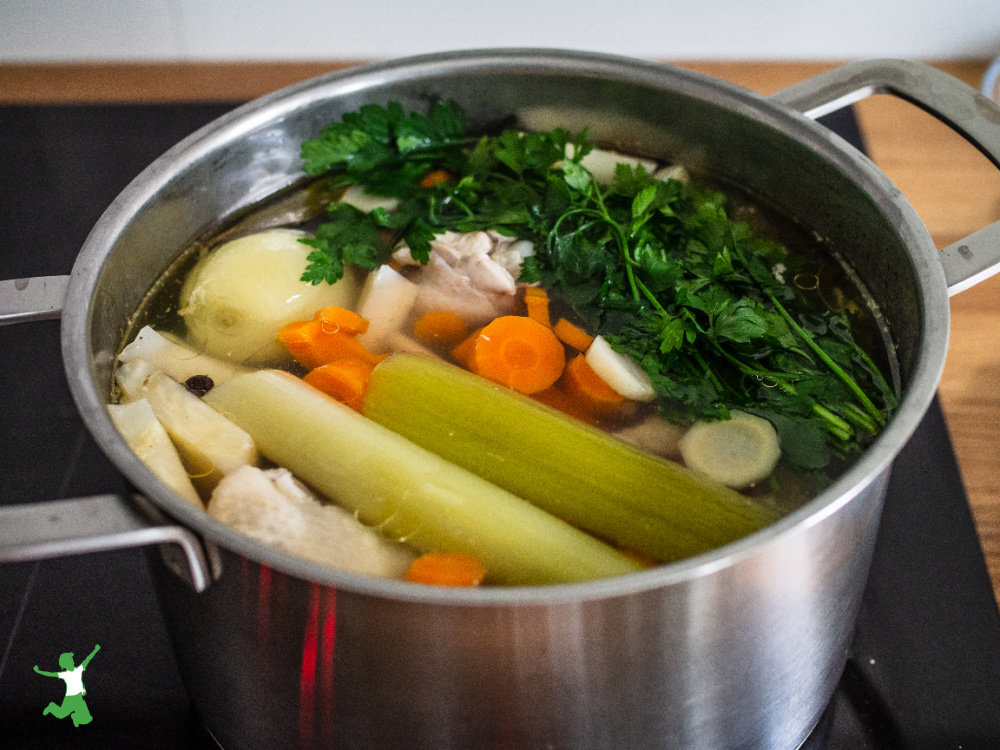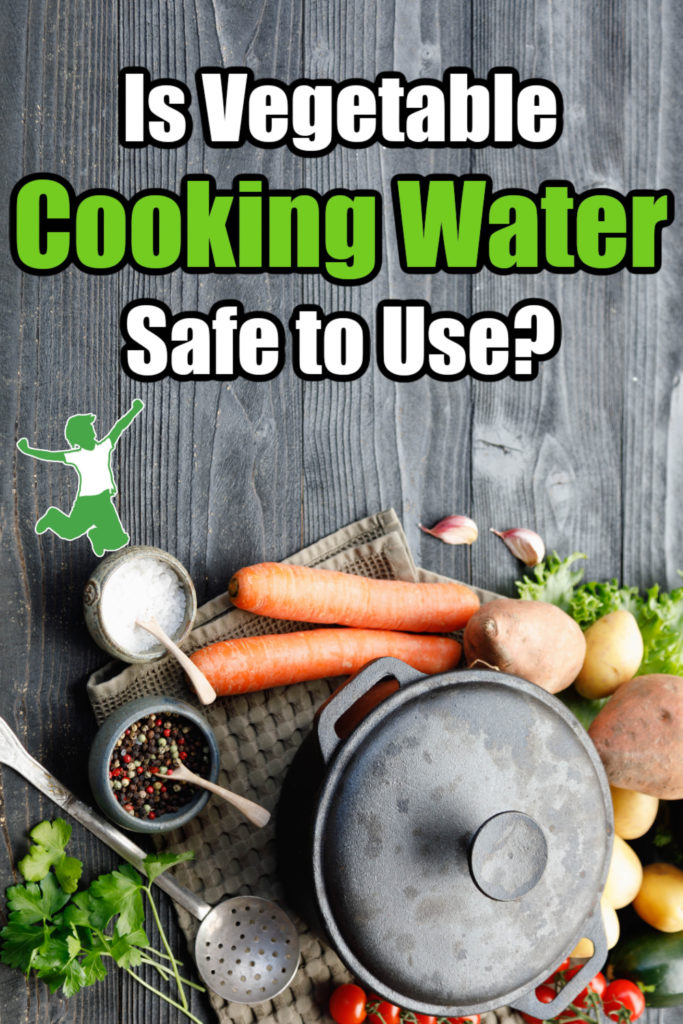Guidelines for when vegetable cooking water is safe to use and when it is best to toss due to nitrites, residues or anti-nutrients that can do more harm than good.

Adelle Davis popularized the practice of saving vegetable cooking water during the Leave it To Beaver era of the American 1950s.
She reasoned that any vitamins and minerals lost from cooking the vegetables would end up in the water.
This supposedly nutrient-rich cooking water could then be added to homemade soups or sauces with the nutrition benefiting those that consumed them.
This notion took hold and has not let go to this day.
Unfortunately, reserving vegetable cooking water can do more harm than good.
Consider the reasons below before you use it in your dishes. How to know your veggie cooking water is safe is discussed as well.
Chemical Residues
If the vegetables that are cooked are not organic, pesticides and nitrites from commercially produced fertilizers can end up in the cooking water.
Even low to no spray veggies such as asparagus would not be safe.
These crops are still typically fertilized with commercial preparations that are high in nitrites.
Anti-Nutrients
Cooking cruciferous vegetables such as broccoli, cauliflower, cabbage, Brussels sprouts, and kale would add goitrogenic (thyroid blocking) substances to the cooking water which should be discarded.
Water used to boil potatoes would contain chemicals called hemagglutinins that disrupt red blood cell formation.
Dark green, leafy vegetables such as beet greens, raw spinach, and chard contain oxalic acid that blocks calcium and iron absorption.
This irritating substance also can cause distress to the sensitive mucous membranes in the mouth and intestinal tract and contributes to the formation of kidney stones.
Consuming raw crucifers or dark, leafy greens is not an alternative either as the substances that cause problems when in the cooking water also cause problems if consumed directly with the vegetable in an uncooked state such as a raw green smoothie.
Legumes & Beans
For the last few years, the vegan community has popularized the trend of reusing legume cooking water, particularly from chickpeas.
This isn’t a safe practice even if the legumes or beans are soaked before cooking.
This soapy, slimy water is called aquafaba and is used as an egg replacement, particularly in dessert recipes. It whips up foamy just like egg whites.
Published research reveals that chickpea cooking water contains saponins, a potent anti-nutrient that contributes to leaky gut, which is at epidemic levels today.
It is also not advisable for pregnant women to consume this substance as it is a miscarriage risk.
Safe Vegetable Cooking Water
Do you really want to use vegetable cooking water as a frugal tool in your kitchen routine?
Consider this list of some of the most popular vegetables below. They are safe to use for that purpose.
- carrots
- turnips
- potatoes (peelings)
- parsnips
- beets
- celery
- organic pumpkins and squash (including zucchini)
- organic onions, leeks, and garlic
- nightshades (tomatoes, eggplant, and peppers among a few others)
For example, this potassium broth recipe uses vegetables simmered in water from the list above.
Simple Guidelines To Follow
Do you find it confusing to remember the distinctions between which organic veggies are safe to use and which are not?
Or, do you buy some veggies organic and others conventional?
If so, it is best to just adopt the practice of not using the cooking water at all.
This is particularly true if you tend to mix veggies together when cooking them.
Never Use Veggie Water for Baby Food
It is of particular importance NOT to use vegetable cooking water for use in pureeing homemade baby food.
Use pure filtered water instead, or if baby is old enough, some homemade bone broth or meat stock.
Final Caution to Consider
One final word of caution.
All vegetables tend to form nitrates after cooking and during storage. These nitrates can transform into strong carcinogens in the intestines.
Hence, it is best to avoid refrigerating and reheating vegetables, particularly leafy, green vegetables which concentrate nitrates when grown commercially.
References
Nourishing Traditions Cookbook









Is washing organic, leafy vegetables and then refrigerating them and consuming them later in the day o. k.?
(Your article said cooking green leafy vegetables , refrigerating them, and reheating later was unhealthy).
Should be ok if they aren’t cooked first.
So does it mean that eating not-boiled vegetables (wok style, frying in the pan, deep frying, SALADS, etc) is extremely dangerous because no pesticides have been removed from the vegetables? This article doesn’t make so much sense for me. Enough quality controls in the food industry make sure that vegetables are not dangerous even though if they are eaten raw. For this reason, many pesticides (as DDT) has been banned in many countries.
Eating organic produce is a good idea if eating veggies raw … yes, you’ve identified a good point there.
if this is true.. then soup is bad for you. This seems to fly in the face of everything we’ve
So, is water from boiling potatoes healthy or unhealthy?
If the potatoes are organic, sprouted areas are trimmed off and potatoes that are green under the skin are not used or these areas trimmed off before cooking (this indicates the presence of a potent toxin), then using the cooking water should be fine. More info on that here: https://www.thehealthyhomeeconomist.com/nightshade-vegetables-can-worsen-pain/
I think the comment has a point. If you boil veggies, the pesticides and nitrites/nitrates end up in water. If you don’t boil them, they stay in the vegetable obviously, implying that you should boil the vegetables and discard water. But then there is little point in eating those vegetable at all after losing all the water soluble vitamins (A, D, E, K), heat-destruction of vitamin C and leaching of minerals as well.
You didn’t give a sound alternative. Sevrly limiting the kind of veggies you can eat is not a great advice. Hence the article mostly served to scare me.
I cook organic whole grain rice with organic chicken bone broth and all organic onions, peppers, celery, spinach together. Are the nutrients in the vegetables still lost or should the vegetables be cooked separately. The rice soaks up all the water, so nothing is discarded..
That’s what I was thinking, too. So does that mean, making a big pot of meat, bone broth and veggie stew (even if you do steam the veggies first and add to the stew, discarding the cooking water) and heating up the leftovers is actually unhealthy? 🙁
Can you explain beilers broth then? Because that recipient from the nourishing traditions book is for broth made from the water left after steaming vegetables and you’ve posted that was healthy before?
So we can’t eat no veggies ,because of pesticides
Seems you’ve missed the point of the article unfortunately.
Hello! I like to boil beets and then put the remaining water in a glass jar , wait to cool , then store in frig to drink next day! Is this harmful?
If the beets are organic, then that would be fine.